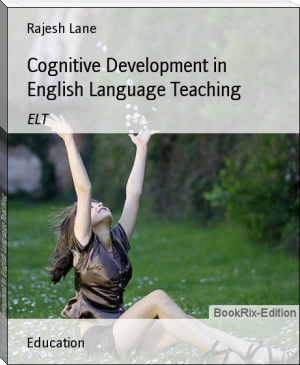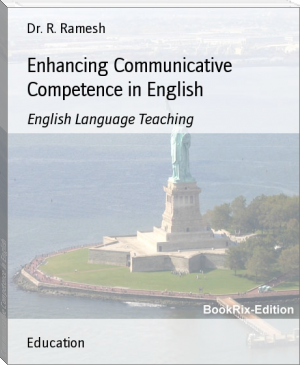Cognitive Development in English Language Teaching by Rajesh Lane (best desktop ebook reader .txt) 📕

Key Features
- promotes learner autonomy
- helps to familiarize usages than structures
- enables to induce creative competence
- helps to develop cognition
Read free book «Cognitive Development in English Language Teaching by Rajesh Lane (best desktop ebook reader .txt) 📕» - read online or download for free at americanlibrarybooks.com
- Author: Rajesh Lane
Read book online «Cognitive Development in English Language Teaching by Rajesh Lane (best desktop ebook reader .txt) 📕». Author - Rajesh Lane
Preface
Cognitive Development in English Language Teaching paves avenues for English Language users to facilitate the contextual language and thereby to enhance the creative competence that can make learners as effective communicators in accordance with the context.
With an eye on developing communicative competence in English, this book has been written to enable the learners acquire the mastery over the English Language. The systematic and unique approach adopted therein will definitely be helpful to the trainers as well as people who are interested in self-study.
This book has five chapters. Chapter one introduction, makes the proposition of the title the hypothesis and the plan of the study. In the same chapter the review of the relevant literature is also made. Chapter two studies the role of emergent syllabus in the second language acquisition of English among the U.G Students, Chapter three is the discussion of the various tasks, as many as twenty six, that may be used in the cognitive development of the students at the U.G level in the second language acquisition. Chapter four is the analysis of twelve tasks assigned to the students in order to study the cognitive development of the students in the U.G class. Chapter five is the record of the summation of the study made and the findings.
BOOKRIX PUBLISHERS
Contents
Chapter I -------- Introduction
Chapter II ------- Role of Emergent Syllabus
Chapter III -------- Cognitive Development in the
Classroom
Chapter IV --------- Analysis
Chapter V --------- Summing Up
Bibliography
CHAPTER ONE
INTRODUCTION
This book is an attempt to bring out the cognitive development of the Second language learners at the Under Graduate (hereafter to be referred as U.G) level. In the process it discusses the cognitive skills such as understanding and creativity of the learners. Through contextualization these abilities can be improved and effective communication skills in English may be achieved.
The need of the cognitive development arises due to the fact that the present teaching system at undergraduate level relies mainly on behavioural psychology. Behavioural psychology focuses on mimicry and memorization and rule-governed behaviour (where in importance is given to grammar). This kind of teaching based on behavioural psychology restricts the learner from practicing effective communication according to the context.
Learners imitate or memorize the text without understanding the subject and submit the same for examination for scoring high marks at UG. Level. Consequently the ability to understand and create is suppressed. The prevailing educational system follows the old texts which were published long back. It is hard to understand the old expressions, patterns of writing and foreign culture, which hinder the modern learner’s understanding. At the UG level learners are frustrated and confused by the mechanical rules of grammar drills. The conscious adherence to rule with laboured effort by learners is prone to misunderstanding. In this process they are taught only the structures of the language and not the usages.
It is learnt that from the study conducted among the UG students that there is no creativity-based syllabus or task-based syllabus. Contextualization of language use also is not within their reach. The educational system recommends the text-based teaching which hinders the creativity and communicative skills of the learners. Learner’s emotion, feeling, expression, strengths, weaknesses and needs are least taken into consideration by the present education system. Teachers fix the learning conditions in all the situations. So the learners never find any chance to learn anything on their own. It is disheartening that the present-day educational system ignores the system of cognitive psychology ie., insight-formation and problem-solving and it’s use in improving the learner’s rule-free communicative skills depending upon the context.
At the UG level conscious way of learning is being followed on neglecting the usages of the second language. The existing educational system fails to introduce the unconscious process of second language acquisition.
Cognitive development-oriented teaching is a competent process to enhance second language acquisition through contextualization. It is a suitable process to eradicate the present problems which are encountered at the UG level. The problems of text-based teacher-centered teaching, lack of creativity-based syllabus, ignorance of context, fixed notions towards learner’s needs, negligence of learner’s understanding and creativity through mimicry and memorization should be reorganized within the existing system. To overcome the present problems and to enhance learner’s understanding, thinking and creative process, the competent process of learner-centered task-based as well as the emergent syllabus with emergent themes of context can be implemented to hurry up second language acquisition.
Perception and recreation are the core processes in the process of communication. What human brain and nervous system know by intuition or by reasoning or through senses to understand and create or solve the issue or subject is cognition.
Cognition is defined by the second major school of psychology namely the school of cognitivism. The cognitivists are of the opinion that the learning depends on perception, and insight-formation. They feel that all learning is in the nature of problem-solving; the new experience constitutes the problem, which the learner tries to solve on the basis of previous learning.
According to Mead Johnson “Cognitive development is the development of the thinking and organizing system of the brain; It involves the language of mental imagery, thinking, reasoning, problem-solving, and memory development”. (Cognitive development,http://www. Google.com 2001).
It would be best to distinguish acquisition from learning. “Acquisition refers to an unconscious process that involves the naturalistic development of language proficiency though understanding language and through using language for meaningful communication. Learning by contrast refers to a process in which conscious rules about a language are developed”. (Approaches and Methods in language Teaching 131).
Acquisition and learning can be illustrated by the following figure:-
Biologists believed that physical growth is a factor to cognitive development. Lenneberg makes the following observation on the matter: “Children are born with the physiological ability to learn a language not the particular language of their parents but any language to which they are exposed. Language cannot begin to develop until a certain level of physical maturation and growth has been attained”. (Language and Cognition, 11)
According to Lenneberg the role of environment in language development diminishes as the child advances in age: “The incidence of language-learning-blocks rapidly increases after puberty. Also automatic acquisition form mere exposure to a given language seems to disappear after this age, and foreign languages have to be taught and learned through a conscious and labourd effort”. (Language and Cognition, 109).
Piaget formulated Biological theory of knowledge. Piaget felt that living organisms are self-regulating in their choices of ways to adopt. Piagetian theory explains how human intelligence develops through an intellectual regulating process geared by adaptation to the environment. During this on-going relationship with the environment, the child exhibits certain organizations based upon assimilation which means the taking in process of experience accepting new encounters and fitting them into existing schemes; and accommodation which means the reaction of the individual who encounters new experiences that are not consistent with existing schemes and so the accept or accommodate the new information. Piaget felt that a baby is an active and curious organism, that reaches out and seeks to regulate a balance between assimilation and accommodation. This balance is what Piaget describes as equilibrium. Piaget considered the process of equilibrium an important factor in the cognitive growth and development of a child.
“Piaget realized that humans progressively develop or mature to higher states of cognitive development and realized that children acquire knowledge transmitted by parents, teacher, and books, he called this Social transmission” (A biological Theory of knowledge, http://www.Google.com).
Vygotsky introduced contextualist approach which stresses that the social situations are (Social transmission) involved in cognition. “Vygotsky assumed that children are born with fundamental cognitive (e.g. attention and memory) and perceptual abilities. This contextualist approach paved way for cognitive growth”. (“Vygotsky and contextualism”, http://www.Google.com.). Later people like “Piaget, Bruner emphasizes the importance of experience for cognitive growth”.
(The ELT-Curriculum, 34).
Piaget, Lenneberg and Vygotsky convey that the process of acquisition of language declines as the child advances in age. For them the child is better than the adult. As far as the second language is concerned, the learner acquires second language later than the first-language. Psycholinguists prove that adult learner also can acquire and create the language cognitively:
It should be noted, however, that an adult learner may use another gift in the learning of language which the child doesn’t possess: the power of mature reasoning, which helps the adult to discover and understand rules more easily than the child. In some cases the adult may,therefore, prove to be a better learner. (”Methods of Teaching
English”, Block –II, 27).
According to Asher “the brain and nervous system are biologically programmed to acquire language”. (Approaches and Methods in language Teaching ,90)
For a second language learner the process of internalization is a must to acquire language. Parallel to the process of first language learning, the foreign learner should first internalize a “cognitive map” of the target language through listening exercises (Approaches and Methods in language Teaching, 90).
Asher in his Total physical Response method directed to right-brain learning. Whereas most of the second language Teaching methods are directed to left-brain learning. Asher interprets that the brain is divided into hemispheres according to function, with language activities centralized in the right-hemisphere. According to jean





Comments (0)